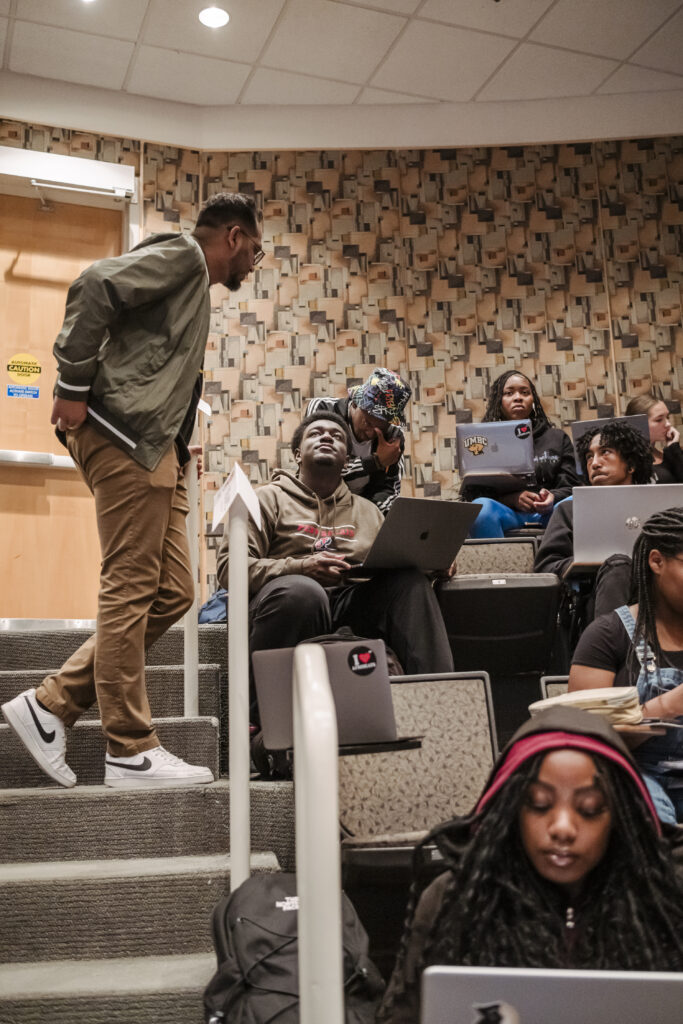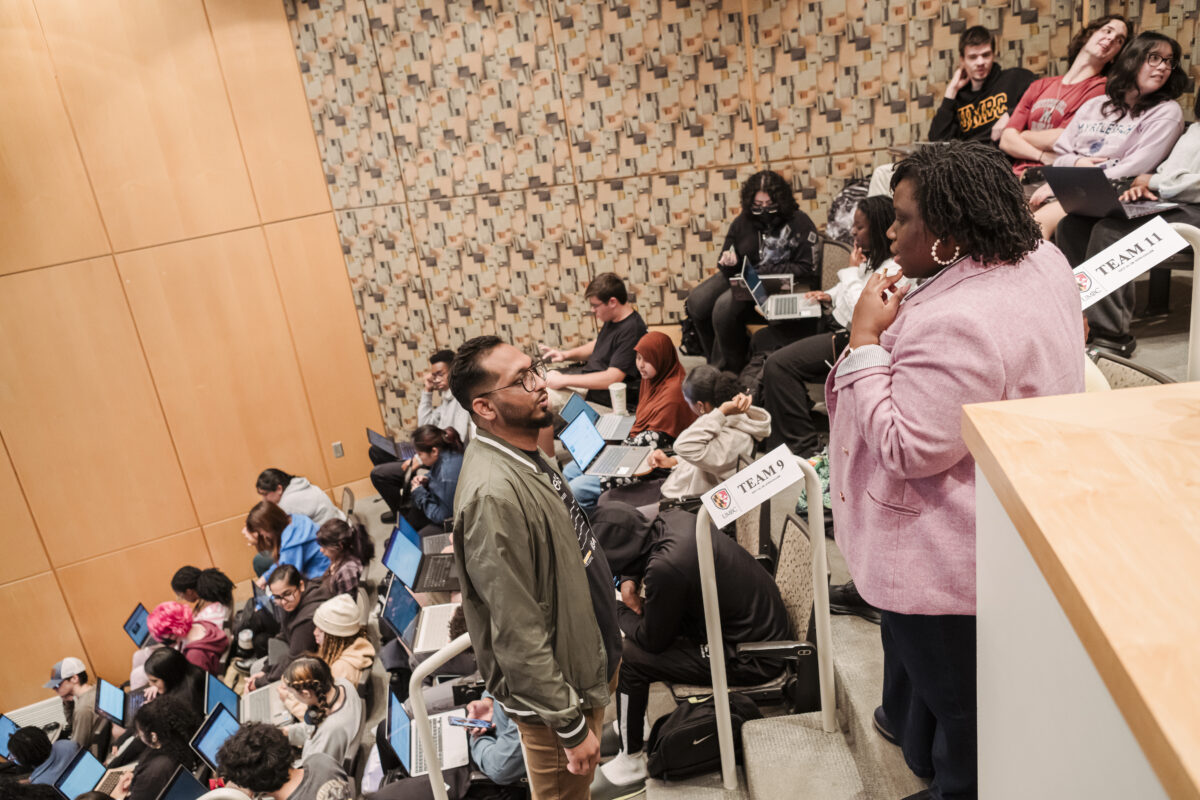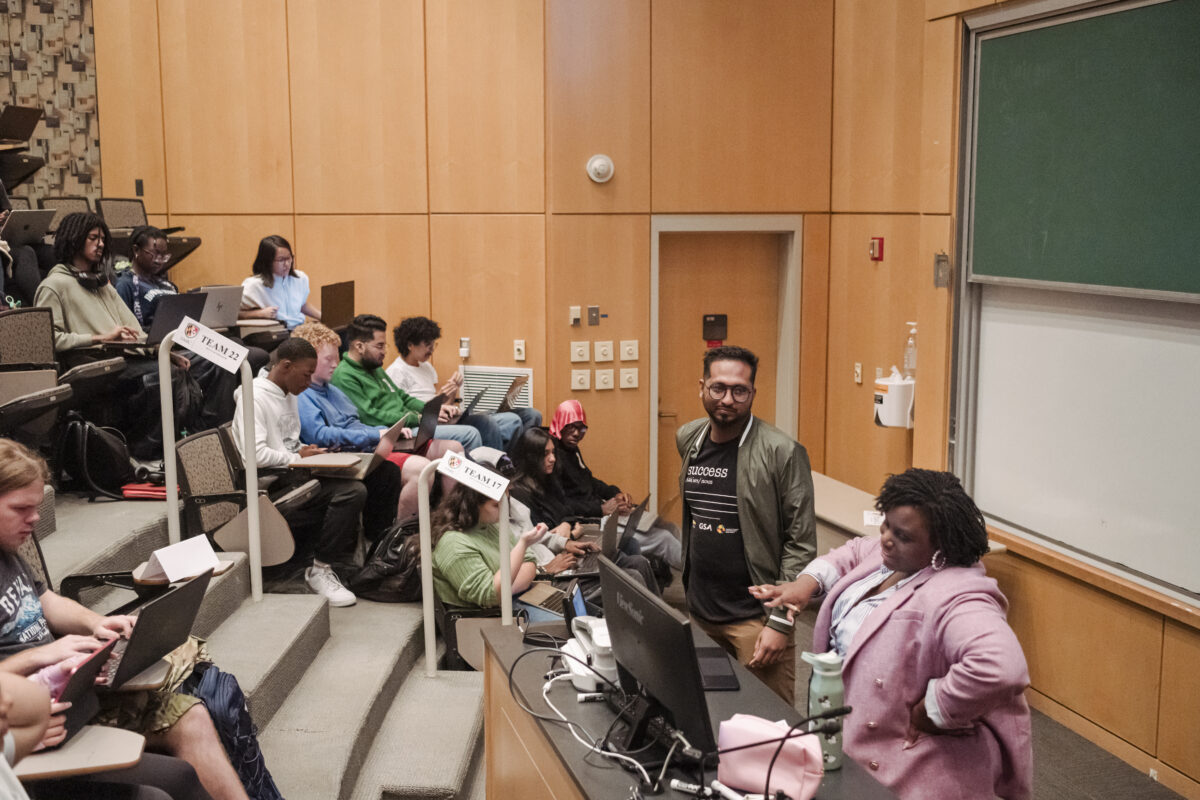Meet Ridwan Islam Sifat, an M.P.P. graduate student pursuing a doctoral degree at UMBC’s School of Public Policy researching healthcare disparities among intersex individuals in the United States. Ridwan joined UMBC as an international student after earning both a B.S. and M.S. in development studies from the Bangladesh University of Professionals, where he studied the social exclusion of Hijra (third gender) people in Bangladesh, examining the effects of government policies and healthcare access. Ridwan was awarded the UMBC Adam Yarmolinsky Fellowship, which supports graduate and doctoral students whose research addresses poverty alleviation, social programs for low-income populations, and international diplomacy and peace. Ridwan appreciates the opportunities UMBC has afforded him and the community that supported him through it all. Thanks for sharing, Ridwan!
Q: What’s one essential thing you’d want another Retriever to know about you?
A: I’m a public policy Ph.D. student in the School of Public Policy and a graduate teaching assistant in the Department of Sociology, Anthropology, and Public Health. I work with the American Political Science Association and the Association for Public Policy Analysis and Management, mentoring graduate students, offering support with graduate admission applications, and research guidance. I also serve as an associate editor for the International Journal of Public Health Science and an article editor for SAGE Open. I have served four times as a judge at the United Kingdom’s Queen’s Commonwealth Essay Competition, the world’s oldest international schools’ writing competition.

Q: What brought you to UMBC in the first place?
A: I came to UMBC because of its strong public policy program, particularly, the health policy concentration. The opportunity to study in a supportive environment with access to faculty expertise and resources, aligned with my passion for researching public policy issues made UMBC the perfect place for my academic journey.
My research interests include the intersection of public health policy with artificial intelligence, equity and social justice, and global health systems. I’ve co-authored several journal articles on these topics, including “Transformative potential of artificial intelligence in global health policy,” and “Food‑based domestic violence and anemia among women in sexual unions in Nigeria.”
Q: What clubs, teams, or organizations are you a part of? What do you love about them?
A: I was a Graduate Student Association senator representing the College of Arts, Humanities, and Social Sciences and a committee member for Equity of Funds during the 2023 – 2024 term. I also worked with the Academic Engagement and Transition Programs as a graduate intern and worked with the Office for Academic and Pre-Professional Advising as an orientation advisor. UMBC’s Bangladesh Student Association promotes diversity by sharing our traditions and fostering cross-cultural understanding within the UMBC community.
Q: What’s the one thing you’d want someone who hasn’t joined the UMBC community to know about the support you find here?
A: The support at UMBC is exceptional—faculty and peers genuinely care about our success. From personalized mentorship to collaborative opportunities, the community is dedicated to helping us achieve our academic and professional goals. It’s a place where you feel valued, encouraged, and empowered to thrive.

Q: Tell us about someone in the community who has inspired you or supported you, and how they did it.
A: My dissertation chair, Dr. Nancy Miller, and my co-chair, Dr. Loren Henderson, offer unwavering support, encouraging me to think critically and providing invaluable feedback on my research, helping me refine my ideas and stay focused. Also, my academic advisor, Dr. Zoë McLaren, guides me with relevant resources and opportunities, ensuring that I am well-prepared for the challenges of academia. Their combined mentorship has been essential to my growth as a scholar.
Q: What have you learned from being a graduate teaching assistant?
A: As a teaching assistant, I have worked with various professors who have helped me develop teaching skill sets that will be useful when I lead my own classes. My first in-person teaching assistant roles were in Dr. Sarah Chard‘s SOCY 619: Qualitative Methods in Social Research, Dr. Aubrey Jackson Soller‘s, and Dr. Mercedez Dunn-Gallier‘s SOCY 101: Basic Concepts in Sociology. In these classes, I learned to facilitate in-class activities, which allowed me to engage directly with students and observe their understanding of course material. I continued to practice these skills in spring 2024, as a TA for Dr. Brandy Wallace‘s SOCY 101 online class. I also worked on assessing students using rubric-based grading and providing them with constructive feedback. This semester, I have returned to Dr. Jackson Soller’s and Dr. Mercedez Dunn-Gallier’s classes where I am applying all of these aspects of teaching.
Q: Tell us about what you love about your academic program or an organization you’re involved in.

A: I love the supportive and collaborative environment at the School of Public Policy, where the faculty’s dedication to student success, interdisciplinary research, and real-world policy impact creates an enriching academic experience. As a graduate teaching assistant in the Department of Sociology, Anthropology, and Public Health, I’m continually developing my skills and knowledge, preparing me for a future in academia.
* * * * *
UMBC’s greatest strength is its people. When people meet Retrievers and hear about the passion they bring, the relationships they create, the ways they support each other, and the commitment they have to inclusive excellence, they truly get a sense of our community. That’s what “Meet a Retriever” is all about.
Learn more about how UMBC can help you achieve your goals.
Explore opportunities at UMBC’s School of Public Policy and Department of Sociology, Anthropology, and Public Health.
Tags: CAHSS, CAHSS_research, Public Policy, Research, SAPH

